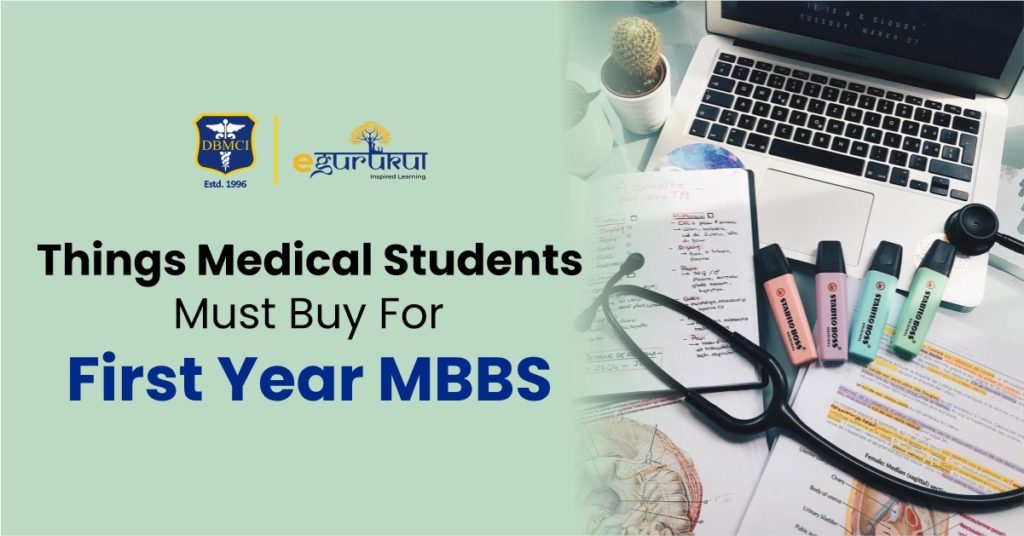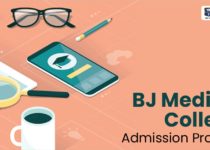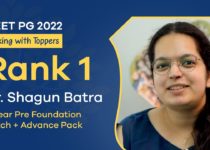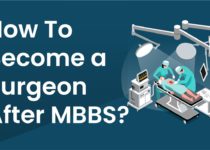Things Medical Students Must Buy for First-Year MBBS

The first year of MBBS can be confusing and challenging to navigate without good guidance. This article will inform you of all things you must buy for your first year of MBBS. As these items are essential, you must not forget to add them to your college checklist!
Apron/White Lab Coat
An apron is the one thing students must always carry along. It can also help students feel and behave professionally. Furthermore, students need to wear a lab coat or apron to practicals, clinical postings, and exams.
Every medical college has its own rules. However, they are more or less the same. Students need at least two coats to account for laundry delays.
Bone Set
A boneset is students’ study buddy throughout the year! Buying a brand-new set can be expensive. However, you can get the whole set from your seniors for much more reasonable prices. Also, the bone set can be passed on to your juniors for a fair price when your work finishes.
Color Pencils for Histology
These are used for drawing figures and diagrams where different colors indicate different body parts. It can help develop a better understanding of the body system.
- Red: Artery
- Blue: Veins
- Yellow: Nerves
- Brown: Muscle
- Green: Fascia and ligaments
- Purple: Lymph channel and lymph nodes
- Black: Bones
Dissection Set
Dissecting kits are used to dissect small animals such as mice, frogs, and many other preserved animals. They contain all necessary tools and instruments to conduct dissection.
A dissection kit contains the following:
- Scalpels and blades
- Dissecting scissors
- Dissection forceps
- Dissecting probes and pins
- Dissection pans and pads
- Dissection fluids
- Retrieving tweezers
- Lab set forceps
- Plastic forceps, with guide pin
- Plastic forceps, with jaw grips
- Nickel-plated forceps with polytetrafluoroethylene (PFTE) coated tips
- Curved, PTFE-coated forceps
- Cover-glass forceps, PTFE coated
- Three-prong holder
Stethoscope
The stethoscope is a medical device for auscultations of the internal sounds of an animal or human body. It is designed based on a small disc-shaped resonator with two tubes connected to two earpieces. It traces the sounds of the heart, lungs, and intestines, and the blood flow in arteries and veins. A stethoscope is also used with a sphygmomanometer when measuring blood pressure.
Pen Torch
An LED-torch medical pen is a handy device made of an aluminum alloy with a flashlight. It can be used for various purposes, including checking a patient’s mouth, nose, throat, eyes, and ears. It consists of a pupil gauge and a 5 cm ruler body.
Thermometer
A thermometer is an accurate and easy-to-use device that helps you know the body temperature in a few seconds. You can place the thermometer in patients’ mouths, under their tongues, or in their armpits. Select a thermometer that can measure temperature in both the Celsius and Fahrenheit scales and is clinically accurate.
Nowadays, digital thermometers are popular. Mercury thermometers are no longer preferred for health and safety reasons. Further, thermometers may sometimes be needed for physiology practicals.
Backpack
A spacious yet lightweight bag is extremely helpful to stash all your medical instruments. A durable backpack can go a long way, especially when you are a student.
Reflex Hammer
A reflex hammer is a medical instrument used by medical professionals to test reflexes. Therefore, it is a crucial part of neurological examinations (central or peripheral nervous system). It tests deep tendon reflexes and helps detect abnormalities in the central or peripheral nervous system.
Gloves
Gloves are essential for medical students. They should not be too loose or tight. You should be comfortable wearing them.
Lancet
A blood lancet is a medical device used for capillary blood sampling. It contains a double-edged needle or blade. Lancets are used to make punctures and obtain small blood samples. They are disposable and used in hematology experiments in physiology lab practicals.
Related Article Links
First-year MBBS Syllabus
The MBBS curriculum is presented by the National Medical Commission (NMC) in India. It includes subjects such as anatomy, biochemistry, and physiology in the first-year syllabus of the MBBS degree.
Anatomy
Also known as gross anatomy, it is the study of the structure of the human body, including muscles, organs, bones, and complex systems.
Histology
Histology studies body tissues at a microscopic level to identify different types of cells in our bodies.
Embryology
Embryology is the study of the structure that develops in the embryological period of a lifetime of a human or the development of various organs and organ systems.
Neuroanatomy
Neuroanatomy is the study of the brain, spinal cord, and all the nerves in the body.
Genetics
Genetics includes chromosomes, karyotyping, gametogenesis, meiosis, mitosis, and their associated disorders.
Physiology
It deals with the normal functions of living organisms and their parts: how a living organism functions.
Biochemistry
Biochemistry includes the functions of cells at the molecular level. It is a combination of basic biology and chemistry, mainly organic chemistry.
Textbooks for first-year MBBS
Use a combination of books written by Indian and foreign doctors. It helps immensely with further studies. Moreover, never rely on a single textbook. It is the worst mistake students can make during academic life.
Anatomy
- The most famous reference textbook for gross anatomy is the one and only Gray’s Anatomy.
The textbooks by Indian doctors for anatomy are as follows:
- Textbook of Anatomy by Vishram Singh
- B. D. Chaurasiya’s Human Anatomy books
- Dissection
Cunningham’s Manual of Practical Anatomy
Histology
Inderbir Singh’s Textbook of Human Histology
It has all the vital information a beginner medical student needs. Newer editions also have an atlas.
- Embryology
- Clinical Embryology by Vishram Singh
- Langman’s Medical Embryology It is an elaborate book on Embryology.
- Guides and Practice Books for Competitive Exams
The following are some recommended books for medical topics that can help you prepare and revise before competitive exams.
- Anatomy: Self Assessment and Review of Anatomy by Dr. Raviraj
- Physiology: Review of Physiology by Dr. Soumen Manna and Dr. Krishna Kumar
- Biochemistry: Self Assessment and Review of Biochemistry by Rebecca James
- Pathology: Review of Pathology and Genetics by Sparsh Gupta and Devesh Mishra
- Pharmacology: Review of Pharmacology by Gobind Rai Garg, Sparsh Gupta, and Ranjan Patel
- Microbiology: Microbiology: An Introduction by Gerard J. Tortora, Berdell R. Funke, and Christine L. Case
MBBS courses usually present an educational pattern that focuses on creating highly efficient medical graduates. The combination of the right textbooks and online/offline coaching centers in your first year can improve your subsequent medical life as a practitioner.
Conclusion
Overall, the site link given for DBMCI, https://www.dbmci.com/, and the books that cover all the subjects in detail can help you become well versed with your subjects.
Happy learning!


